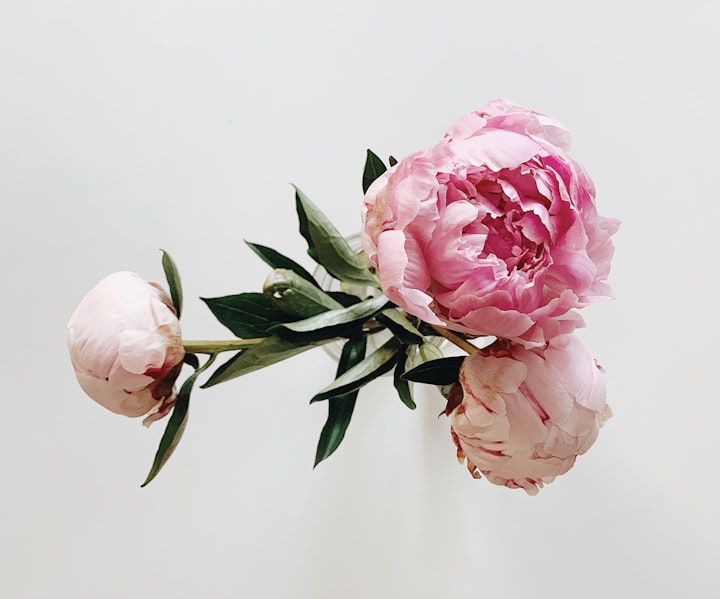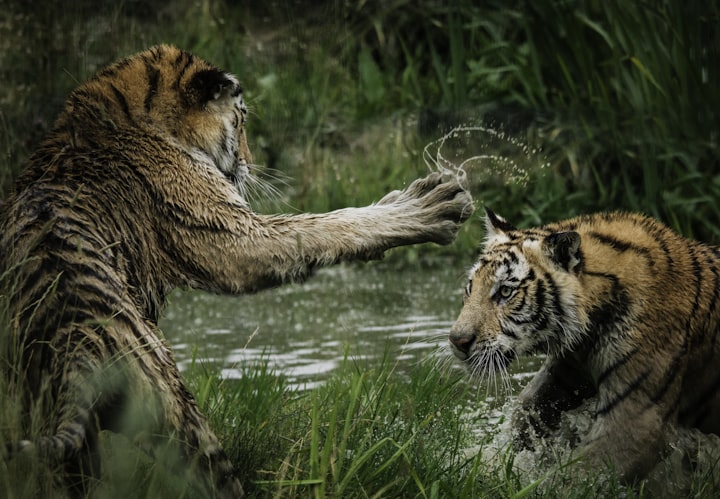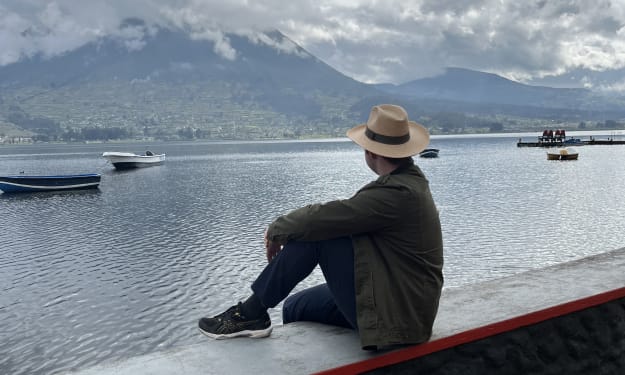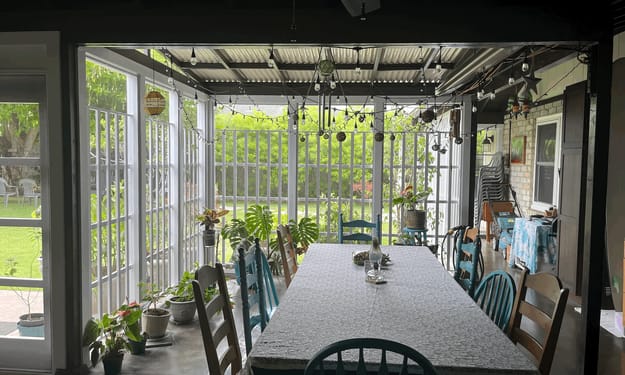The DNA of God
Where you are is only a small part of the world

Off the coastline, an easterly mixes air and water warm, inducing atmospheric motion. Laden gray clouds are free now to travel to land.
She knows it is Ester by the rap of the knock. Old, widowed women have a distinct politeness blended with purpose when they knock; never a ring; or least wise not on this hill where doorbells were never installed. Annie knows Ester is upset over the theft, over the trespassing, over the nerve— “Can you imagine somebody sneaking up my seventeen steps in the middle of the night and cutting every single bloom off your mother’s prized peony, what on earth is the world coming to?”
If Annie had opened the door and had invited Ester in, each taking their familiar kitchen table stations sitting at opposite ends, with Annie leaning back square against the chair, her arms crossed and elbows resting on wood while Ester slump slightly forward, her arms relaxed with her paper-thin skin fingers folded neatly and limp on her lap, Annie would have answered in fact, “Blame global warming. Haven’t you heard? It’s all going to hell in a hand-basket.”
Ester would then sigh, not to acknowledge what Annie just said, but rather as introduction of what comes next said on Ester’s conversation agenda, and so Annie would wait patiently silently counting the rings of grain of the oak of the table running straight to where Ester begins to rattle off a compiled gleaning of every horrific Metro story Ester reads living section of the paper on a daily basis—from lead story to last obituary. Though in truth, the obits were never read word for word, but skimmed for names, age, and cause of demise. The year after year effect of this was two-fold: Ester at an advanced age called herself, “street smart,” and became an amateur statistician on life expectancy from a narrow demographic point of view of the world. In conclusion, at the end of the recap of what happened the day before, Ester would again sigh, this one a little longer and say, “So sad for so many, I’m right dear, don’t you think?”
Here, on an average, day after day sort of day, Annie would nod her head to Ester to politely agree, as Annie has for the most of thirty-six years of her living life. Annie would then get up out of her chair and walk over to the stovetop, grab the handle of the teakettle, walk over to the sink, and turn the cold water on and would say, “I think it’s time for some Chamomile tea.”
This would give Ester her queue to tell her Ester history, a history Annie herself is a part of, including the first sighting of Annie’s head into this questioned world.
However, this will not happen today.
Today, the strip of paper out of the pregnancy kit turned the color Annie deleted her savings account to see. Today was the beginning. Today, Annie promised the future to be the new paradigm, the new mother. Today she would be Annie no more. She would choose a new name along with naming the child planted inside her.
Off the coast of Ecuador and Peru, El Nino warms water and the water evaporates in dense tropical rain clouds soon to be monsoons, soon to be released where soil cannot absorb another drop of water. Fishermen hang their empty nets. Ethiopian farmers throw dice on straw mats that quiets the dust raised from the earthen floor, a place where use to stand a yield of a year’s worth income from corn. In Australia, brush fires ravish unknown territory outside the realm of industrial man.
Annie knows Ester stands outside her front door needing to come in for a rest. Since the doctors took the vein from Ester’s leg to sew to the trouble spot somewhere around Ester’s heart, Ester says she can’t get around like she used to. And though, she has most of Ester’s stories committed to memory, she doesn’t mind listening to most of the telling, the reports, the interpretations according to Ester of what life across the street was once like in her house—the Woman’s House of three generations living together.
Annie stands still and backs up against the living room wall next to the window with the postcard taped in the corner nearest to the front door. She bought the postcard down in Mexico right before the first trip to the Center for Reproductive Medicine at Century City Hospital. The postcard is a drawing of a palm tree surrounded by blue water, and underlined with the caption, “The weather is here. Wish you were beautiful.”
The postcard is situated for Ester with her spyglasses to read and someday is expected to give in and make a comment about. Annie did the postcard test year and two weeks after her mother died. Her adding two and two and Ester together totaling to the good reason why Ester would know of her comings and goings—or not goings, of Annie standing for sometimes an hour or more at the living room window looking for life being lived in the city down below, while she lived her life now with just herself, all alone.
Over the Pacific, streams of air at low levels drift toward the equator—The Trade Winds. Streams of air at elevated levels drift toward the poles—The Westerlies. The place where these two surface streams meet creates a band of low pressure, creates calm placid water, and is named the Doldrums. Language is lulled here. Ocean and Atmosphere have nothing to say to the other. No wind to push warm surface water away allowing cold tongue current to rise. No upwelling of nutrients. No blending of sun, phytoplankton, and explosive growths of chlorophyll.
Yet, Ester never mentions the postcard. Ester only tells the stories that everybody already knows. Like the story of Annie’s birth, like the time when Annie’s grandmother took Ester shopping into the city to pick out a dress, the same dress Ester To this day, Ester to this day still tosses her hand as if throwing a hankie into a fight pit. “Men,” Ester will say, “are just like that. They have animal needs that woman just don’t understand.”
Which is Ester’s statement whenever the subject of men, and not Metro news, are discussed. Ester could be referring to the gardener’s two-week disappearance, of the history where Annie’s father should be. Of the grown boy two houses down in a fit of rage with a pipe wrench in his hand, pipe wrench beating muffin tin pits on a Chevy rusting away with each rain, which incidentally, did not make the Metro news, even though, Ester reported the crime.
Rhythm and oscillation. Boreal. Austral. Why predict the weather? Why look to a sky pushing gray, concealing blue, and sun streaming down making Jesus clouds before or is it after thunder warns birds to move closer to ground?
If the air weren’t so peony with that peony smell, sweet and with just a touch of the sexual, Annie would have let Ester in and upon the first sentence taken control.
Annie would have said, “Ester, sit down dear; let’s look at Mother’s gardening journals. Yes, I know this comes as quite a shock. Yes, it’s true I’ve had them all along. Now, now, there, there, please dear, you’re getting too old to get so upset.”
The journals are brown leather bound with black felt pages filled with paragraphs and drawings, and up Kodak, photographs of plants, known and unknown, native, or not, of decades of the hillside garden grown on a plot not quite half of an acre. Her mother illustrated the unspoken with plants. In the years of Ester’s marriage, in photograph after photograph, each with the single same sentence written: North bed boarding Ester Callahan’s cottage, is a patch of dirt, afflicted with Scotch Broom.
More times than cares to be mentioned, Ester has seen Annie’s edition of albums. Each time, Ester comments on how clever Annie is. The way Annie juxtaposes snapshots according to holiday and age between three generations. The way, whenever there is a page with photographs that include Annie’s grandparents together, young, and beautiful, until the page that places Annie’s grandmother at forty and Christmases stop, and grandpa is dead. From this page on, there is page after page of two women and a baby. Two women and a little girl. One woman, a girl, and an old woman. A woman and a young woman. A woman and an old woman. A woman alone.
In each album, after each holiday, two pages are left blank for the future generation, for Annie’s child. Annie dreams up this child as a sculptor would out of clay. She blends her mother’s chiseled nose into her grandmother’s cheeks, high and round, shelving green eyes stolen from an Afghan woman on the cover of an old National Geographic.
Annie has said in the past, “Ester, I’m pregnant.”
Ester has cackled.
Annie has said, “Well, I’m going to get pregnant.”
Ester then said, “Oh, who then is the lucky invisible ‘fella?”
Annie then said, “Ester, get with the modern times, you don’t need men anymore.”
La Nina, companion to the Christ child, beyond gender, cools the tropical Pacific. Quiets Indonesian rain. Licks current as current should be licked. Sweet mother-of-food-web starts upwelling. Blends sun, water, and phytoplankton. The water blooms green. Small perturbations and fish swim, as they should. Swim fast and furious. Fluctuation of normal upper troposphere flow with a quasi-stationary center of high pressure over the North Atlantic, and it snows and snows and snows. Big fish eat little fish and little fish eat zooplankton eat pieces of tongue.
Ester stands square on the horsehair mat that does not include the one word that’s supposed to be the message laid out for friends or stranger to stand on.
Ester shakes her head in disappointment and mumbles, “Well now, just consider the source to understand the intention.”
Ester looks down at her white sneakers and daydreams the vision of her, forgotten by everybody now, except Ester, of Ester’s satin-dyed-aquamarine shoes with heel made of daggers. She, in those shoes with a body to match, stood on this very porch on another mat with Welcome spread in the thickest of block letters.
That mat belonged to Annie’s mother. Both the nemesis and best friend Ester would ever have. Girlfriend called, sister, more times than not by anybody who saw the two beauties together. Girlfriend who Ester surmised slept with the first star struck boy who had the nerve to ask—girlfriend who immediately became mother. Of course, Ester didn’t say Girlfriend like young girls on television now do. Then, Ester, with her hands on her hips, shouting, and “Girly! Hey Girly!” to the house down and across the street, waving like a fool to her friend—a carbon copy of Annie.
Annie—she has no idea of history. She has no idea of story. No version to compare to. Poor dear, she doesn’t hold a candle to her mother, to Hey Girly, to nemesis, to Best Friend, to Ester’s husband’s murmuring in his sleep. Ester never repeated the latter. Some stories are not meant to be told. Besides, Annie’s mother and Ester co-authored the chapter of silly girls vying for the same young man’s attention, just a sweet-talking boy then, who came once a week, rain, or shine, toting his brown leather sample bag full of items to make a woman’s life easier.
Ester raises her hand and knocks. Slow, measured, and purposeful in urgency.
“I am here, and I am beautiful,” Ester states to out loud.
Ester looks through the peephole on the front door, looks at the fish-bowl version of herself in pink top-hat frustration, and muffles a laugh. She takes a Kleenex from out of her pocket, spits into it, and covers the sight up.
Astrobiologists tell us the organic chemistry of the universe is carbon, hydrogen, nitrogen, and oxygen—the same building blocks for the origin of life on earth. Earth’s evolution’s one prerequisite was and is water—Hydrogen and oxygen.
Life, Annie thinks, stirs quickly inside her. She reaches down to the small swell of her stomach, then tiptoes backward and turns to creep up the stairs of her house. Annie stops at the landing. She pivots around and to her front door says in her best heart-wrenching whine: “Sorry old woman. I have animal needs that you don’t understand.”
Annie then prances in place and waltzes the rest of the way to her bathroom to dance with the strip of short stiff paper turned pink with result.
Annie turns her bathroom sink facet on cold and watches the water pour forth before putting a glass under it.
Under the peony spell, Annie remembers her mother’s perennial garden bed outside her childhood bedroom window. The peonies, first to bloom smell, mixed with the moist rot of the earth, through the open window in spring. Her mother would take in a deep breath, before tucking her in for the night. “That’s what heaven smells like, so glorious.”
Annie thinks of her mother’s face. Remembers the smell of her grandmother. Annie thinks of the bare spot outside now out her bedroom window, The true place for the peony bush, where new roots were once nourished by tissue and blood. The place of buried placenta. Of her mother’s blood. Her grandmother’s blood that pulsed and fed life forming in a bubble, of life floating and becoming human in genetic complexity, of bone, of hair, of sex, in fingernails growing.
Annie turns the water off and holds the glass up toward the light. She watches tiny bubbles rise to the surface. She leans closer to the bathroom mirror. Her ovaries press into the edge of pink Formica,
The mirror frame is a carved continuous circle of wooden cherubs all flying clockwise. Perfect round babies frame her face as she looks into the only mirror she has ever known. Annie has forgotten the man’s name, which Ester says, carved these frames for a living and she doesn’t ask Ester. Doesn’t want the old prune to start naming names of those who are gone. A list of the missing, one of whom was the artist of angelsor was it a friend of Ester’s husband an associate, a comrade-in-arms balancing soapsuds, brushes, and smiles, door to door?
“My sweet love” Annie heard her mother once say to the mirror, with fingers brushing a cheek of one of the wooden faces, “You gave me such a gift.”
There is no oral history given, no photo documentation, of the trade agreed upon by her mother and Ester some thirty years past. The trade—dead wood carved heavenly for living Peony wood flowering, sight for smell—was considered an even exchange.
Annie brings the glass up to her lips drinks.
Virtually every organism on earth depends on the nonliving environment, a union of light energy and water and carbon to produce the nutrients of living material.
The Peony has grown over Ester’s wrought iron railing which is rusting and useless for bodily support as Annie, as of last night, can attest to.
In last night’s storm, Annie escaped the railing’s intention, the rain’s drumming determination, as she cut each and every flower with poultry shears snipping away.
Once home, Annie placed the flowers in a large cut-crystal vase on top of her nightstand.
“Sweet angels,” Annie said out loud, on her knees by her bed like a child,” please let it be true.”
Annie fell asleep taking in the peony smell, with her hand on the round of her belly. /She slept sound and deep. In her dreams, to heaven, she returned.
A new microbe, SAR-11 has been discovered. SAR-11 seemly invisible, was impossibly photographed. SAR-11 reveals a single cell of light. SAR-11 abundant and believed to play a key role in the global cycling of carbon and oxygen. SAR-11, the DNA of God.
Ester curses under her breath and knocks once more, a rapid-fire knuckler, heart racer, which does not end as expected. A, I-won’t-stop -until-you-answer-this-door-I-know-you-can-hear-me, knock.
This is outrageous. This is more nerve than Ester can possibly bear. Hadn’t Ester treated Annie the same as a daughter, or worse yet, a grandchild? Yes. This was Ester’s doing. Spare the rod and spoil the child type of doing.
Ester always forgives Annie.
Ester always looks the other way. Doesn’t hear Annie say the things Annie does when Ester wants the equivalent of:
Ester, you are the best.
Ester, you are so kind.
Ester, you are wise. Are good. I can't bear the thought of this world spinning without you...
Ester stops knocking.
The old woman stifles a sob.
Ester takes out her hand that remains as a fist inside the pocket of Ester’s raincoat.
That is what this is about after all. Isn’t it?
Ester opens her fist. The newspaper clipping is wadded and small. The obit of that horrible two-timing man. The obituary column Ester looks for in every day’s paper and knew would be in this morning’s paper the moment Ester looked out her kitchen window and saw that the new blooms of peonies were missing—vanished—plain gone.
Ester turns away from Annie’s door and watches the rainwater cascade from the gutter missing a downspout onto the front porch.
Ester walks over near to the spot and sits down on the swing hanging empty.
There is the squeak of going forward.
There is the squeak in the chain going backwards.
There is the sound of pouring water.
Ester hums along as accompaniment to a song a handful of children are singing a half of block down and away, marching arm and arm, and balancing a brilliant array of their parent’s bad taste in umbrellas.
The children’s boots stamp for the maximum slap on wet cement. Stomp, keeping time with their song, “Oooblah dee. Oooblah dah…
Ester stops swinging. Stops humming. Ester’s nose wrinkles up.
The refrain is clear and the message moot. Of course, life goes on, why shouldn’t it?
About the Creator
Erin Leonard
As a writer, I enjoy writing short stories, screenplays, and poems.
Enjoyed the story? Support the Creator.
Subscribe for free to receive all their stories in your feed. You could also pledge your support or give them a one-off tip, letting them know you appreciate their work.






Comments
There are no comments for this story
Be the first to respond and start the conversation.